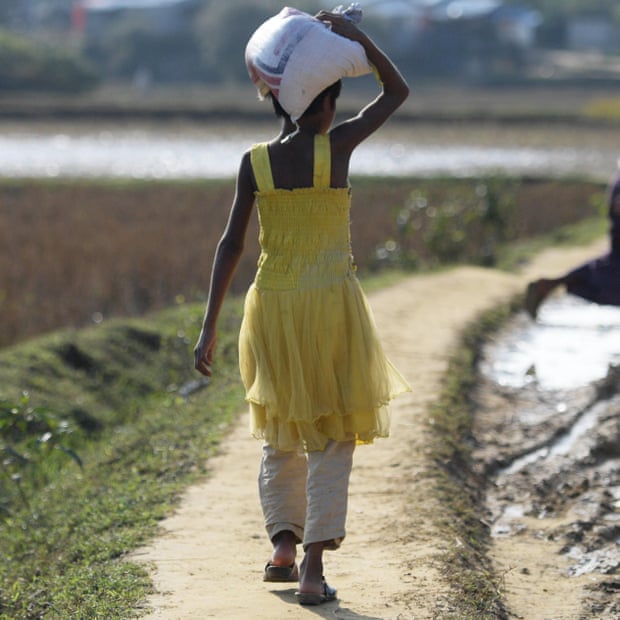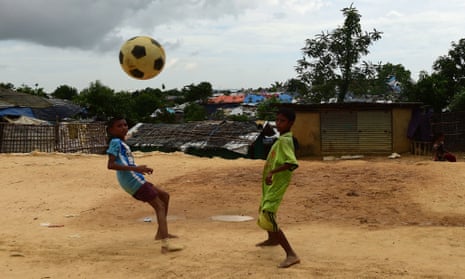Rohingya refugees are turning to blockchain-type technology to help address one of their most existential threats: lack of officially-recognised identity.
Denied citizenship in their home country of Myanmar for decades, the Muslim minority was the target of a brutal campaign of violence by the military which culminated a year ago this week. A “clearance operation” led by Buddhist militia sent more than 700,000 Rohingya pouring over the border into Bangladesh, without passports or official ID.
The Myanmar government has since agreed to take the Rohingya back, but are refusing to grant them citizenship. Many Rohingya do not want to return and face life without a home or an identity. This growing crisis prompted Muhammad Noor and his team at the Rohingya Project to try to find a digital solution.
“Why does a centralised entity like a bank or government own my identity,” says Noor, a Rohingya community leader based in Kuala Lumpur. “Who are they to say if I am who I am?”
Using blockchain-based technology, Noor, is trialling the use of digital identity cards that aim to help Rohingya in Malaysia, Bangladesh and Saudi Arabia access services such as banking and education. The hope is that successful trials might lead to a system that can help the community across southeast Asia.
Under the scheme, a blockchain database is used to record individual digital IDs, which can then be issued to people once they have taken a test to verify that they are genuine Rohingya.
Quick GuideWhat is the Upside?
Show
Ever wondered why you feel so gloomy about the world - even at a time when humanity has never been this healthy and prosperous? Could it be because news is almost always grim, focusing on confrontation, disaster, antagonism and blame?
This series is an antidote, an attempt to show that there is plenty of hope, as our journalists scour the planet looking for pioneers, trailblazers, best practice, unsung heroes, ideas that work, ideas that might and innovations whose time might have come.
Readers can recommend other projects, people and progress that we should report on by contacting us at theupside@theguardian.com
Noor’s goal is to give Rohingya the power to reclaim their identities with a resilient system that their host countries will recognise, allowing them access to social programmes, legal rights, education and healthcare. At this stage, the Rohingya Project’s main objective is to address the most prominent issue facing stateless peoples: financial exclusion.
Noor’s team is one of a group of refugees and stateless peoples around the globe who are harnessing the power of blockchain technology to reclaim their identities.
The concept of the blockchain comes from the digital currency bitcoin, which tracks the movement of money around its ecosystem by grouping transactions into 10 minute-long blocks, each of which is inextricably linked to every previous block in a chain of transactions going back to the currency’s creation.
Because of how those blocks are created and linked, they can serve as an immutable record of who owns what, even without any central authority verifying the network as a whole. That property – the idea of a decentralised, “trustless” database – has proved appealing to uses beyond e-money, with blockchain startups now offering everything from cloud computing to virtual trading cards.
It has gained popularity among humanitarians in recent years, with charities using it to transfer money cheaply and disburse aid to refugees.
Tufic Al Rjula’s birth certificate was destroyed in Kuwait during the first Gulf war. Living for two years in a Dutch refugee camp as he worked through the asylum process, Al Rjula met more than 1,000 other “invisible” men, women and children whose identifying documents were either destroyed or unverifiable.
Years later, having personally experienced how centralised, paper-based IDs such as birth certificates, drivers licences and degrees can easily be lost, forged or misused, Al Rjula co-founded award-winning startup Tykn with Jimmy Snoek. Tykn’s mission statement is to provide “self-sovereign identity to all”.
Q&AWho are the Rohingya and what happened to them in Myanmar?
Show

Described as the world’s most persecuted people, 1.1 million Rohingya people live in Myanmar. They live predominately in Rakhine state, where they have co-existed uneasily alongside Buddhists for decades.
Rohingya people say they are descendants of Muslims, perhaps Persian and Arab traders, who came to Myanmar generations ago. Unlike the Buddhist community, they speak a language similar to the Bengali dialect of Chittagong in Bangladesh.
The Rohingya are reviled by many in Myanmar as illegal immigrants and suffer from systematic discrimination. The Myanmar government treats them as stateless people, denying them citizenship. Stringent restrictions have been placed on Rohingya people’s freedom of movement, access to medical assistance, education and other basic services.
Violence broke out in northern Rakhine state in August 2017, when militants attacked government forces. In response, security forces supported by Buddhist militia launched a “clearance operation” that ultimately killed at least 1,000 people and forced more than 600,000 to flee their homes. The UN’s top human rights official said the military’s response was "clearly disproportionate” to insurgent attacks and warned that Myanmar’s treatment of its Rohingya minority appears to be a "textbook example” of ethnic cleansing.
When Aung San Suu Kyi rose to power there were high hopes that the Nobel peace prize winner would help heal Myanmar's entrenched ethnic divides. But she has been accused of standing by while violence is committed against the Rohingya.
In 2019, judges at the international criminal court authorised a full-scale investigation into the allegations of mass persecution and crimes against humanity. On 10 December 2019, the international court of justice in The Hague opened a case alleging genocide brought by the Gambia.
Al Rjula cites the punch card system used by the Nazis in the second world war to identify and track people on the basis of ethnicity as an example of the ways traditional forms of ID can be exploited and undermined.
Snoek says that while paper-based ID is “non-resilient” to forgery, discrimination and loss, a blockchain-based system offers better protection.
In their host countries, refugees and stateless peoples are often found living on the periphery of society. Unable to work legally and operating in cash-based “dark” economies rife with exploitation, they are prevented from building the network of official connections needed to verify their identity and open a bank account.
Blockchain-based initiatives, such as the Rohingya Project, could eventually allow people to build the network of relationships necessary to participate in the modern global economy and prevent second and third generation “invisible” people from slipping into poverty. It could also allow refugees to send money across borders, bypassing high transaction fees.
In Jordan’s Azraq refugee camp, the United Nations World Food Programme (WFP) is using blockchain and biometrics to help Syrian refugees to purchase groceries using a voucher system. This use of the technology allows the WFP to bypass bank fees.
But Al Rjula says privacy is still an issue. “The technology is maturing, yet implementation by startups and emerging tech companies is still lacking,” he says.
The involvement of a trendy technology such as blockchains can often be enough to secure the funding, attention and support that start-ups – whether for-profit or charitable – need to thrive. But companies such as Tykn still have to tackle plenty of the same issues as their old-fashioned database-using counterparts, from convincing governments and NGOs to use their services in the first place to working out how to make enough overhead to pay staff, while also dealing with the fickle issues of building on a cutting-edge platform.
Blockchain-based humanitarian initiatives will also need to reckon with the problem of accountability in their efforts to aid refugees and those trapped in the limbo of statelessness.
Dilek Genc, a PhD candidate at the University of Edinburgh who studies blockchain-type applications in humanitarian aid and development, saysif the aid community continues to push innovation using Silicon Valley’s creed of “fail fast and often,” and experiment on vulnerable peoples they will be fundamentally at odds with humanitarian principles and fail to address the political roots of issues facing refugees.
This article is part of a series on possible solutions to some of the world’s most stubborn problems. What else should we cover? Email us at theupside@theguardian.com
